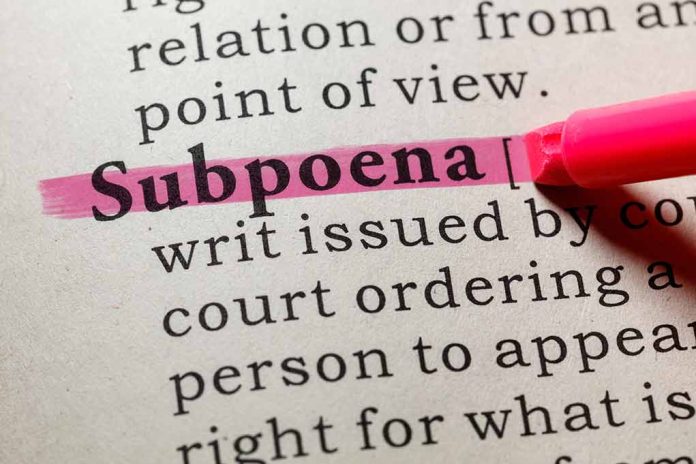
Iowa Republican Rep. Mariannette Miller-Meeks takes bold action against the shocking 344% surge in antisemitism by introducing a bipartisan bill that will establish a commission with subpoena power to investigate the root causes of hatred toward Jews in America.
Key Takeaways
- Rep. Miller-Meeks’ bill would create an 8-member bipartisan commission with the power to hold hearings, issue subpoenas, and obtain information from government agencies.
- The commission would study antisemitism for one year before delivering a report with findings and policy recommendations to President Trump and Congress.
- The Anti-Defamation League reports a staggering 344% increase in antisemitic incidents over the past five years.
- This legislative action follows the House passing the Antisemitism Awareness Act with a 320-91 vote to address rising antisemitism on college campuses.
- The commission would dissolve 120 days after submitting its report, having provided factual data on antisemitism without predetermined political findings.
Bipartisan Effort to Address Rising Antisemitism
Rep. Mariannette Miller-Meeks of Iowa is spearheading critical legislation to combat the alarming rise of antisemitism in America. Her proposed bill would establish a commission dedicated to studying the causes and impacts of antisemitism across the country. The timing is particularly significant following a fatal shooting of a couple outside a Jewish museum in Washington, D.C., highlighting the urgent need for comprehensive action. The commission would consist of eight members appointed by House and Senate leaders, with no more than four from the same political party, ensuring a balanced approach to this critical issue.
“First and foremost, assert the awareness that the issue exists and acknowledgment that antisemitism acts have been on the rise, and this most recent one [the fatal shooting of a couple outside a Jewish museum in Washington, D.C., I think, underscores the need for an overview,” said Rep. Mariannette Miller-Meeks.
The legislation grants the commission substantial investigative powers, including the ability to conduct hearings, issue subpoenas, and collect data from U.S. government departments and agencies. This comprehensive approach aims to produce a thorough understanding of antisemitism in America today. The commission’s findings would be compiled into a detailed report with policy recommendations for review by President Trump and Congress, dissolving 120 days after submission. This structure ensures focused action rather than creating a permanent bureaucratic entity.
I’m proud to announce I’m introducing a bill to establish a national commission to study the rise of antisemitism in the U.S.
We must face this crisis head-on with facts, action, and bipartisan resolve.
Read more in @DailySignal: https://t.co/kOVZESwx31
— Rep. Mariannette Miller-Meeks, M.D. (@RepMMM) June 2, 2025
Recent Congressional Actions Against Antisemitism
This initiative follows the House of Representatives’ recent passage of the Antisemitism Awareness Act, which aims to address the rising tide of antisemitism on college campuses. That bill, which passed with a significant 320-91 vote, adopts the International Holocaust Remembrance Alliance’s definition of antisemitism for enforcing federal anti-discrimination laws in education. The definition includes examples such as accusing Jews collectively for actions of individuals and making stereotypical allegations about Jews, providing clearer guidelines for identifying antisemitic behavior.
“Right now, without a clear definition of antisemitism, the Department of Education and college administrators are having trouble discerning whether conduct is antisemitic or not, whether the activity we’re seeing crosses the line into antisemitic harassment,” said Rep. Mike Lawler.
While some Democrats expressed concerns about potential limitations on free speech, particularly regarding criticism of Israel, others firmly rejected this characterization. The legislation has gained traction amid growing reports from Jewish students feeling unsafe and harassed on college campuses, with some being advised to leave for their safety. House Speaker Mike Johnson’s visit to Columbia University to meet with Jewish students underscores the political attention this issue has received as antisemitic incidents continue to rise nationwide.
A Truly Bipartisan Approach
Rep. Miller-Meeks emphasizes that addressing antisemitism is not a partisan issue but rather a matter of protecting American citizens and upholding our values. The commission’s structure reflects this commitment to bipartisanship, with leadership positions shared between parties. The chairperson and vice chairperson would be decided by the Speaker of the House and the House minority leader, ensuring diverse perspectives in the leadership team. This approach acknowledges that effective solutions must transcend political divisions.
“It is not an issue that is relevant to only Republicans. There’s a lot of support across the aisle,” said Rep. Mariannette Miller-Meeks.
The Anti-Defamation League’s report of a shocking 344% increase in antisemitic incidents over the past five years provides stark evidence of the problem’s severity. Through this commission, Miller-Meeks aims to gather “factual information, factual data” that can inform effective policies and raise awareness. By involving local officials and faith communities in reviewing the commission’s findings, the bill creates a pathway for educational outreach and community-based solutions that can address antisemitism at multiple levels of American society.







